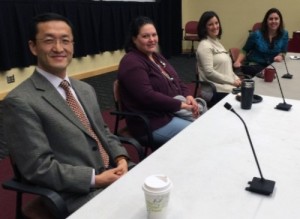To advance from scholarly teaching to SoTL, transformation of teaching activities into scholarly research can occur by following these 10 steps:
- Observation – Make an observation within your educational environment – can be a success or a problem that needs solved or improved.
- Review background literature – This assists in forming research ideas, topics, and study designs.
- Question – Develop a clear research question based on the observation of interest.
- Hypothesis – Transform the question into a predictive hypothesis.
- Study design – Develop a plan to test the research hypothesis, refer to existing literature for methodologies, consult with a statistician.
- IRB – Submit the research plan to your Institutional Review Board to obtain human subjects approval.
- Implement study design & collect data – Mixed methods (quantitative +qualitative) approaches yield strong results and analyze results in context of the hypothesis.
- Disseminate – Present findings in the form of a conference presentation or journal article.
- Revise — Using peer feedback.
- Resubmit — Celebrate when accepted, revise and resubmit if possible, and plan for next steps. Educational research is ongoing and cumulative.
For more information of transforming teaching activities into publishable scholarly projects, this “How to guide” is a great starting point: http://advan.physiology.org/content/30/2/83.short
Citation: O’Loughlin, 2005. A “how to” guide for developing a publishable Scholarship of Teaching project. Advances in Physiology Education Jun 2006, 30 (2) 83-88; DOI: 10.1152/advan.00027.2005
